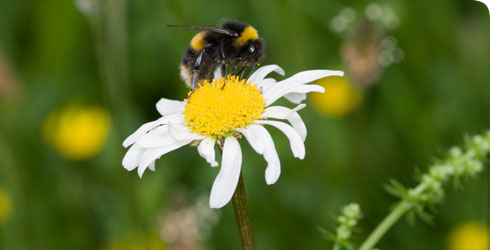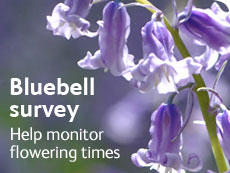Changing seasons
Global warming is already causing spring to begin earlier than it did in the past, in temperate countries like the UK.
Plants such as the early spider orchid are blooming days earlier than they used to, and this could become weeks if global temperature continues to increase.
This is a problem because flowers rely on insects to pollinate them. If the flowers bloom too early, when there aren’t any insects around, then they will no longer be able to reproduce.
Fungi are also affected. Some species are beginning to fruit earlier in the spring and later in the autumn than they used to.
Fungi are an important source of food for many species. Some of them may not get enough food if fungi fruit when they aren’t around.
Different effects on different species
Climate change doesn’t affect all species in the same way.
Some insects have begun to migrate to the UK to breed earlier in the season than they used to. But others may not return until after the plants they pollinate have started flowering.
This means that plants and pollinators are in the same place for fewer days each year.
For insects, this affects their food source. For plants, it affects their ability to reproduce.
Species moving northwards
Many species of insect have begun to extend their range northwards. For example, 34 of 37 British species of dragonfly have expanded northwards since 1980. If plants do not expand their range in the same way then, again, they won’t be in the same place as their pollinators at the same time.
Disrupting the breeding season
The breeding season of birds is also affected by the changing climate. Birds try to hatch their young when the most food is available. For many birds, this means the time when their insect prey are most abundant.
Birds use environmental cues to work out when to breed, to make sure that the eggs hatch when the food supply is at its best.
Some of these cues are affected by climate, and may cause birds to breed earlier in the season. Others are independent of climate, for example, the number of daylight hours.
Although some birds are now breeding earlier in the season, others are breeding too late to hatch their young at the time of peak food supply.
Effects on ecosystems
Climate change does not only affect individual species – it affects the interactions between species. In other words, it affects a whole ecosystem.
Insects, plants, fungi and animals all depend on each other for crucial processes like reproduction and feeding. If these interactions are disturbed then many different species will be affected, and could become extinct.
Some species may be able to adapt to the changing conditions, but if the climate increases too quickly then adaptation will be more difficult and some species may not be able to adapt in time.
Toolbox

In World War II the Museum was used as a secret base to develop new gadgets for allied spies, including an exploding rat!

